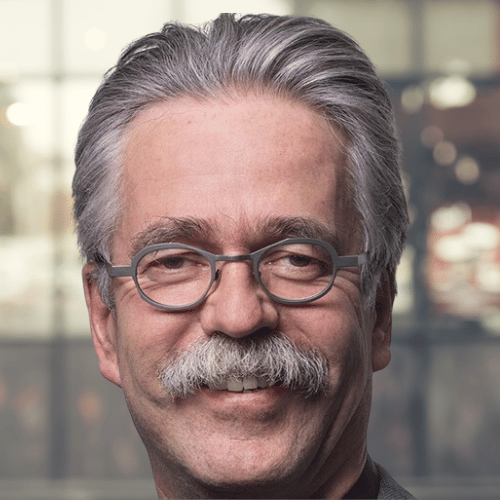
Jelte Bos

Leerstoel
Vestibular Motion and Orientation Perception (Vrije Universiteit Amsterdam, Faculty of Behavioural and Movement Sciences, Department of Human Movement Sciences).
Onderzoeksgebied
Het evenwichtsorgaan, ook wel het vestibulaire systeem genoemd, speelt een belangrijke rol in de waarneming van beweging en oriëntatie en de aansturing van de bewegingen van ons lichaam, hoofd en ogen. Om deze waarneming en aansturing te optimaliseren, combineert het centraal zenuwstelsel de informatie van het evenwichtsorgaan met die van de ogen en andere zintuigen en cognitieve informatie.
Als iemand gezond is en onder natuurlijke omstandigheden werkt dit verbazingwekkend goed. Maar bij ziekte (bijv. de ziekte van Ménière) en onnatuurlijke omstandigheden (zoals reizen per auto, schip of vliegtuig of in virtuele omgevingen) kunnen deze waarneming en aansturing inadequaat en uiterst beperkend zijn, met als gevolg bijvoorbeeld vallen of (draai)duizeligheid en verschillende bewegingsziektes (zoals wagen-, zee-, lucht-, cyber-, simulator- en ruimteziekte).
Deze zaken zijn van bijzonder belang voor militair personeel, dat onder extreme omstandigheden moet functioneren. Met de technische vooruitgang en als gevolg van het feit dat we steeds ouder worden, zullen deze effecten in de komende jaren naar verwachting een steeds grotere rol gaan spelen. Niet alleen in fysieke omstandigheden, maar ook in virtuele omgevingen.
Samen met universiteiten is het de opdracht van TNO om te werken aan de vertaling van deze fenomenen in effectieve oplossingen.
Belangrijkste publicaties
-
Bos JE, Bles W (1998). Modelling motion sickness and subjective vertical mismatch detailed for vertical motions. Brain Research Bulletin 47:537-542.
-
Bos JE, Bles W (2002). Theoretical considerations on canal-otolith interaction and an observer model. Biological Cybernetics 86:191-207.
-
Bos JE, Bles W, Groen EL (2008). A theory on visually induced motion sickness. Displays 29:47-57.
-
Bos JE, MacKinnon SN, Patterson A (2005). Motion sickness symptoms in a ship motion simulator: effects of inside, outside, and no view. Aviation Space and Environmental Medicine 76:1111-1118.
-
Diels C, Bos JE (2016). Self-driving carsickness. Applied Ergonomics 53:374-382.
-
Longtin A, Milton JG, Bos JE, Mackey MC (1990). Noise and critical behaviour of the pupil light reflex at oscillation onset. Physical Review A 41:6992-7005.
Soesterberg
Kampweg 55
3769 DE Soesterberg
Postadres
Postbus 23
3769 ZG Soesterberg
-
Telefoon:+31 88 866 15 00
-
E-mail:[email protected]